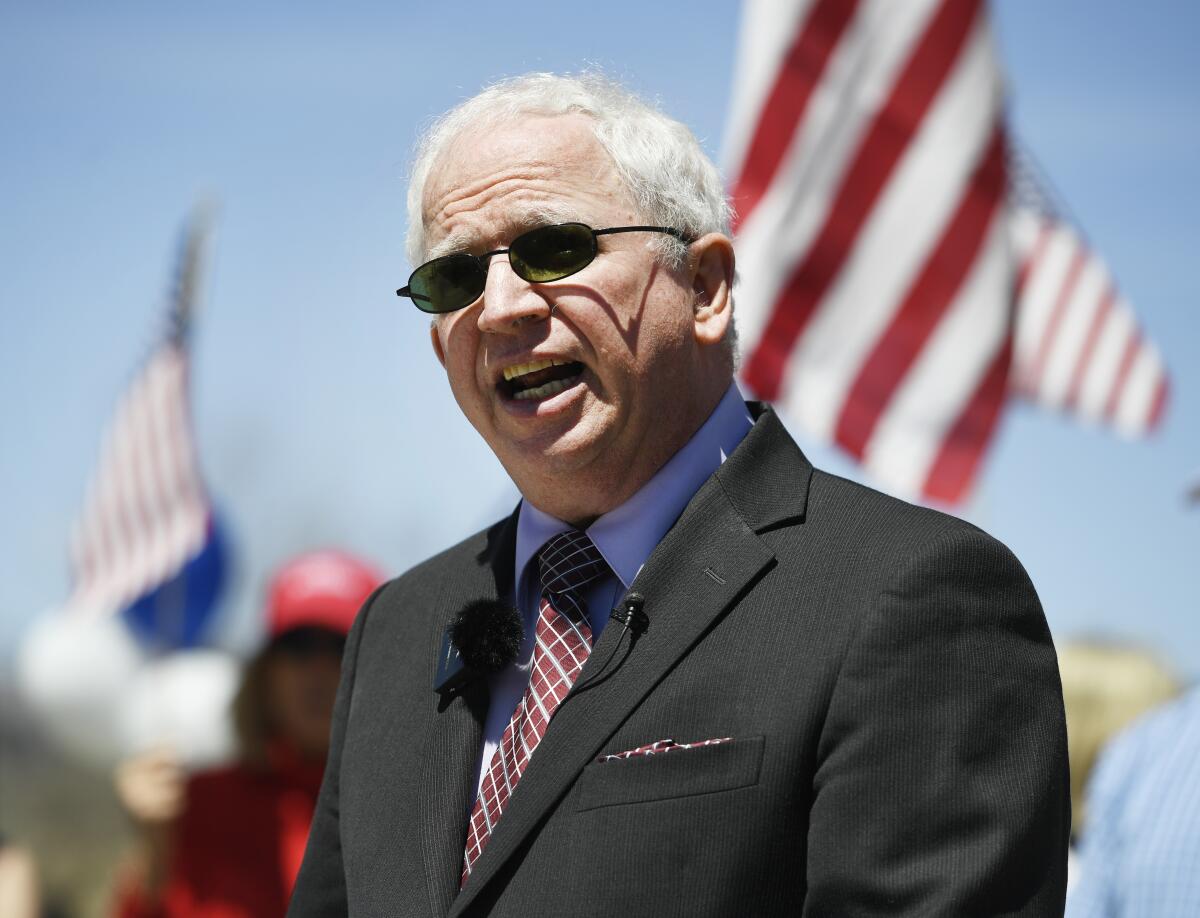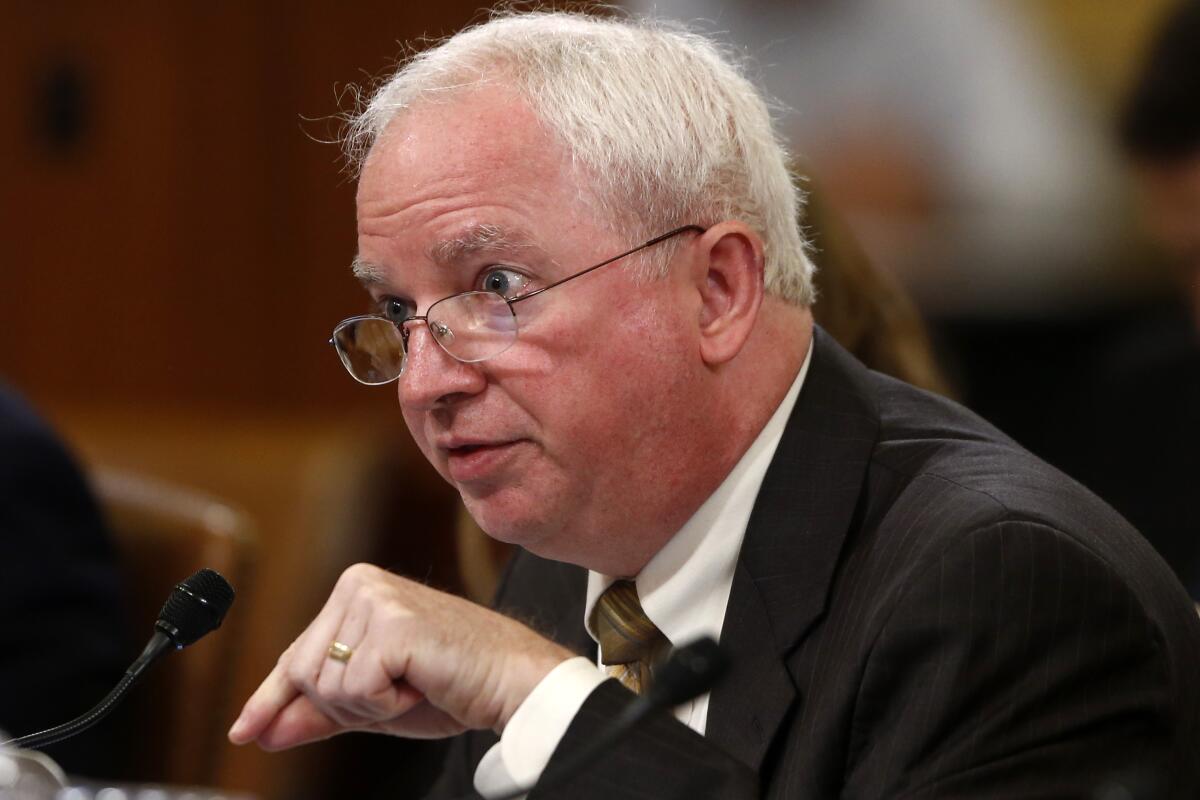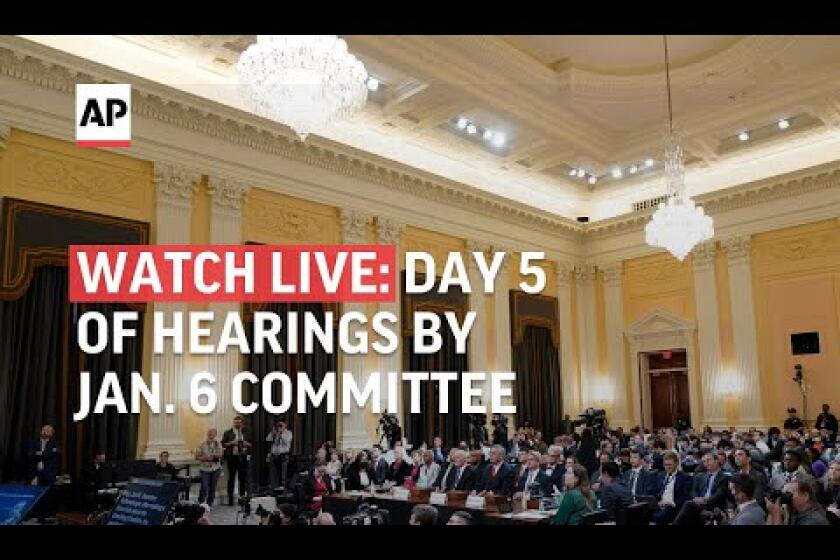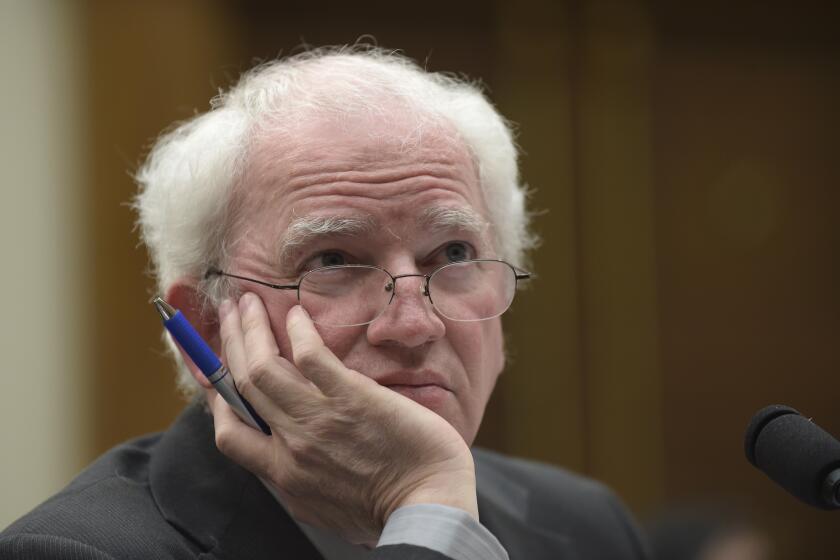John Eastman’s long, strange trip to the heart of the Jan. 6 investigation

- Share via
The theme of the third congressional hearing on the Jan. 6 insurrection was unmistakable: John Eastman was not just a peripheral figure in the panel’s investigation, but a main character. If Eastman was tuning in, though, the proceedings may have struck him as something else — a bizarro episode of “This Is Your Life.”
On the dais was the panel’s vice chair, Republican Rep. Liz Cheney of Wyoming, with whom he attended University of Chicago Law School. Another alum, Greg Jacob, was at the witness table, detailing Eastman’s relentless attempts to persuade Jacob’s boss at the time, Vice President Mike Pence, to unilaterally block the counting of the electoral votes that would cement Joe Biden’s victory.
Offering testimony at Jacob’s side was retired federal Judge J. Michael Luttig, a foundational figure in Eastman’s early legal life. Eastman’s clerkship with Luttig led to yet more long-standing friendships — with Texas GOP Sen. Ted Cruz and Supreme Court Justice Clarence Thomas and his wife, Ginni — that are fodder in the investigation.
Beyond happenstance or the clubbiness of conservative politics, the key figures, institutions and ideologies of Eastman’s life have converged in the Jan. 6 hearings to a remarkable degree. An analysis of Eastman’s profile in the nearly 40 years before he became President Trump’s lawyer, along with interviews with more than a dozen friends and associates, reveal how Eastman’s seemingly sudden notoriety was decades in the making.
Together, they paint a picture of a man with an insider’s connections and an outsider’s boundary-pushing instincts; a man who poured his considerable intellect into a political philosophy that, in increasingly dire terms, sees a country drifting from its core values.
Three former leaders of the Justice Department testified at Thursday’s Jan. 6 hearing about then-President Trump’s attempts to pressure them to advance debunked election fraud claims.
The Eastman described by his longtime friends is a genial and generous absent-minded professor type. A movie buff and a prankster. A devout Catholic and a Deadhead.
He is also, after the June 16 hearing, a person condemned by his onetime mentor Luttig, who said under oath and on television that Trump and his allies — and by implication, Eastman — are “a clear and present danger to democracy.”
::
In a drab Buena Park hotel ballroom one evening in March, Eastman warned a captivated audience of conservative activists that the nation’s “authoritarian moment” had arrived. He blamed the usual Trump nemeses — election administrators in battleground states, Democrats, disloyal Republicans, the media. (Eastman and his attorney initially agreed to an interview for this story, but ultimately did not respond to multiple requests for comment.)
Threaded into the speech — a fact-checker’s nightmare, premised on insinuations, cherry-picked figures and discredited sources — were ruptures that hit closer to home. The Orange County Register, which had editorialized against him after years of quoting him as a trusted source. Chapman University, where he taught law for more than 20 years before a post-Jan. 6 uproar led to his retirement. Now he was wiped off the faculty directory website.
His delivery was droll, and his audience laughed. But his biting tone when those local institutions came up underscored the reality that the life Eastman built over decades in Southern California had palpably changed.
Eastman, 62, moved west after college, drawn to study at Claremont Graduate School, the home of influential conservative philosopher Harry Jaffa.
Jaffa, a scholar on Abraham Lincoln, is best known for coining the iconic lines in Sen. Barry Goldwater’s 1964 Republican National Convention speech that “extremism in defense of liberty is no vice” and “moderation in the pursuit of justice is no virtue.”
The phrase fed the sense that Goldwater was too extreme, contributing to his landslide presidential loss. But the lines laid down a marker for a new movement of unstinting conservatism and made Claremont a magnet for Jaffa’s acolytes.
For conservatives, Claremont was “the beacon,” said Terry Hallmark, a former classmate of Eastman’s who now teaches philosophy at the University of Houston. “Because you could be comfortable thinking what you thought and hanging out with people that were of like-mindedness without being attacked.”
Claremont students revered America’s founding, and saw moral relativism and an increasingly powerful government bureaucracy as existential threats.
“We thought there were so many things that have decayed, from our point of view, in the character of the republic,” said Steven Hayward, a former roommate of Eastman’s at Claremont, now a conservative author and blogger.
While in graduate school, Eastman met his future wife, Elizabeth, a fellow doctoral student. He also started working at the nearby Claremont Institute, a think tank founded by four of Jaffa’s students that is unaffiliated with the school and would become Eastman’s nearly lifelong intellectual and professional home.
After law school and stints in Washington, he returned to California. He litigated on behalf of conservative causes from his perch running a legal center at the Claremont Institute, and became a law professor at Chapman University, serving for a time as the law school’s dean.
He brought in high-profile conservatives such as Thomas, and invited his friend John Yoo, a former lawyer in George W. Bush’s administration and a tenured professor at UC Berkeley, to come teach, offering Yoo a break from blowback over his involvement with what came to be known as the torture memos.
As conservatives in a mostly liberal legal academic world, “you accept you’re going to be in a role where you’re in the minority,” Yoo said. “Maybe that makes you a little ... used to being in the dissent.”
Eastman maintained his links to the conservative legal establishment, actively participating in the influential conservative judicial network the Federalist Society and leading its practice group on separation of powers. But he also had an iconoclastic streak, such as his long-held position that the 14th Amendment does not guarantee citizenship to people born to noncitizens on U.S. soil.
The interpretation, widely rejected by most legal experts, came into broader public view during the 2020 election, when he wrote an article asserting that Kamala Harris, the Oakland-born child of immigrants, was not eligible to be vice president. But to old friends such as Hayward, the argument was vintage Eastman.
“He’s utterly fearless about taking on conventional wisdom,” Hayward said.
Eastman debated that stance, among many others, with Erwin Chemerinsky, who was his amiable liberal sparring partner on the radio for 15 years, under the moniker “The Smart Guys.”
“The appeal of it was we could debate very controversial issues, but always in a very civil way,” said Chemerinsky, dean of UC Berkeley Law.
The judge said Trump likely committed felony obstruction of Congress and that Trump and attorney John Eastman likely conspired to obstruct Congress.
Some who encountered Eastman as a political campaigner, however, found him to be less upstanding.
In an underdog bid for California attorney general in 2010, Eastman sought a ballot designation of “assistant attorney general” to boost his odds. The catch: It was based on his work on a single case in South Dakota. A judge soon rebuffed his attempt.
It is hardly unusual for candidates to try to pull off ballot title chicanery. But Kevin Spillane, campaign manager for Steve Cooley, the eventual GOP nominee, said Eastman’s moves undercut his reputation as a respected legal authority.
“When he engaged in such a dishonest and outrageous effort to essentially lie to voters, that tells you everything you need to know about his character,” Spillane said.
Around that time, Eastman became a public face of the National Organization for Marriage, a group that promoted 2008’s Proposition 8, which banned same-sex marriage in California. He led the organization‘s years-long battle to keep its donor list private, which resulted in a string of court losses and fines for violating state disclosure laws.

Fred Karger, a gay Republican activist who doggedly sought the group’s financial records, said he saw a pattern in Eastman’s actions then and in the current congressional investigation.
“He has a history of lying and undermining our election laws as best he can,” Karger said.
::
With Eastman undeniably central to the Jan. 6 investigation, the people in his orbit are grappling with how much he should remain in their lives.
Chemerinsky publicly urged the State Bar of California to investigate Eastman, which it began doing this spring, and he decided to never share billing with Eastman again.
His last radio appearance with Eastman, in October 2020, still disturbed him more than a year later.
“It was the first time I ever debated him where he wasn’t civil. I felt like I was debating Donald Trump,” Chemerinsky said.
Jeremy Rosen, a Los Angeles appellate lawyer and fellow Federalist Society member, said he also noticed a gradual shift, predating Trump, in his onetime friend.
“He went from being more of a happy warrior to an angry warrior over time,” said Rosen, who immediately after the Jan. 6 attack urged the Federalist Society to remove Eastman from leadership and public events. In Eastman, he saw a symbol of the increasing anger in the country’s politics overall.
But others have not kept their distance. Ryan P. Williams, president of the Claremont Institute, lauded Eastman on Twitter as “a patriot concerned about the oligarchic corruption of America.” (Williams did not respond to requests for comment.)
Eastman remains a senior fellow at the institute, which, after decades on the geographical and intellectual fringes of the right, found new prominence during the Trump years. The think tank’s embrace of upheaval and crisis as necessary to usher in America’s renewal aligned neatly with the norms-busting president.
“Claremonsters,” as they call themselves, use apocalyptic rhetoric to convey the staggering stakes, as they see them, or to at least get people’s attention.
That cataclysmic viewpoint spilled into the Jan. 6 hearings, when former White House lawyer Eric Herschmann said in a deposition that he had warned Eastman his scheme to have the vice president invalidate the election would “cause riots in the streets.”
“And [Eastman] said words to the effect of, ‘There has been violence in the history of our country, Eric, to protect the democracy or protect the republic,” Herschmann said.
Eastman was so committed to this line of thinking that he continued to seek avenues to overturn Trump’s loss, even in the immediate aftermath of the attack on the U.S. Capitol. He unsuccessfully sought a pardon from Trump and now finds himself potentially in criminal jeopardy.
“Unfortunately, he drank the Kool-Aid that President Trump was selling — that the election was a fraud,” Yoo said.
But back in that hotel ballroom in Buena Park, Eastman showed no signs of second-guessing.
“My old professor used to say, if you’re not catching incoming flak, that means you’re not over the target,” he told his audience. “Well, ladies and gentlemen, I think I have been directly over the target for quite some time.”
The conservative activists, with extended applause and hearty laughter, signaled they agreed.
More to Read
Get the L.A. Times Politics newsletter
Deeply reported insights into legislation, politics and policy from Sacramento, Washington and beyond. In your inbox twice per week.
You may occasionally receive promotional content from the Los Angeles Times.












